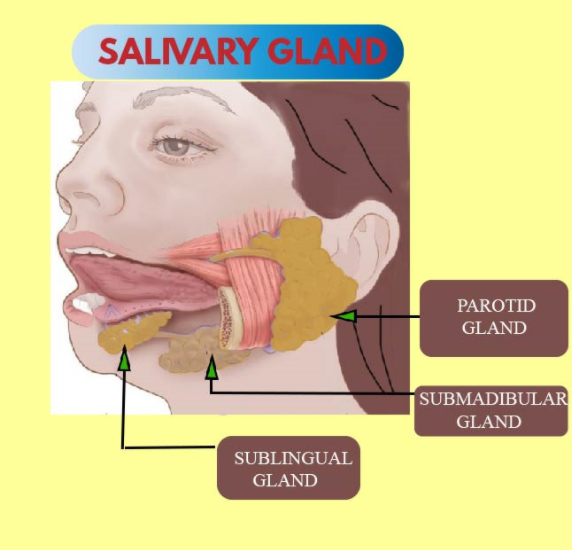
The largest salivary gland present in human is
(a)Submandibular gland
(b)Sublingual gland
(c)Parotid gland
(d)Gastric gland
Answer
588k+ views
Hint: It is a paired gland that produces most of the saliva and situated posterior to the mandibular ramus in the mouth. They secrete saliva to help in mastication, swallowing, and amylase to begin the digestion of starches.
Complete answer:
The parotid glands are the largest salivary gland that is present on each side of the head in front of the ears. Each parotid gland is made up of two parts; the superficial lobe and the deep lobe. The parotid gland secretes serous saliva which is a watery solution rich in an alpha-amylase enzyme called ptyalin. The gland enters into the oral cavity through the parotid duct.
There is a facial nerve between the two lobes. This nerve is important because it controls the ability to close your eyes, raise your eyebrows, and smile. Other structures include the external carotid artery that supplies major blood to the head and neck region and the retromandibular vein which is a branch of the jugular vein. The parotid gland produces 20% of the total salivary content in the oral cavity.
Additional Information: Except for parotid, there are two other salivary glands named, submandibular and sublingual glands.
Submandibular glands: They are the paired saliva glands that contribute nearly 60-70% of the unstimulated saliva secretion and present beneath the floor of the mouth. The submandibular gland receives the blood supply from facial and lingual arteries.
Sublingual glands: These glands are almost almond-shaped that present on the floor of the oral cavity. The sublingual glands contribute only 3-5% of the overall saliva and the secretion is important in initial digestion, lubrication of food, and keeping the oral mucosa moist.
Gastric glands: Gastric glands are present in different parts of the stomach that secretes gastric juices and protective mucous. It includes the cardiac gland, fundic gland, and pyloric gland.
So, the correct answer is ‘parotid gland’.
Note: -A viral infection, called mumps is caused by an infection in parotid glands.
-Parotidectomy is a term that is used for surgery to treat a parotid gland tumor.
-The secretion of saliva is regulated by parasympathetic stimulation.
-Acetylcholine is the active neurotransmitter that binds to muscarinic receptors in the glands and leads to increased salivation.

Complete answer:
The parotid glands are the largest salivary gland that is present on each side of the head in front of the ears. Each parotid gland is made up of two parts; the superficial lobe and the deep lobe. The parotid gland secretes serous saliva which is a watery solution rich in an alpha-amylase enzyme called ptyalin. The gland enters into the oral cavity through the parotid duct.
There is a facial nerve between the two lobes. This nerve is important because it controls the ability to close your eyes, raise your eyebrows, and smile. Other structures include the external carotid artery that supplies major blood to the head and neck region and the retromandibular vein which is a branch of the jugular vein. The parotid gland produces 20% of the total salivary content in the oral cavity.
Additional Information: Except for parotid, there are two other salivary glands named, submandibular and sublingual glands.
Submandibular glands: They are the paired saliva glands that contribute nearly 60-70% of the unstimulated saliva secretion and present beneath the floor of the mouth. The submandibular gland receives the blood supply from facial and lingual arteries.
Sublingual glands: These glands are almost almond-shaped that present on the floor of the oral cavity. The sublingual glands contribute only 3-5% of the overall saliva and the secretion is important in initial digestion, lubrication of food, and keeping the oral mucosa moist.
Gastric glands: Gastric glands are present in different parts of the stomach that secretes gastric juices and protective mucous. It includes the cardiac gland, fundic gland, and pyloric gland.
So, the correct answer is ‘parotid gland’.
Note: -A viral infection, called mumps is caused by an infection in parotid glands.
-Parotidectomy is a term that is used for surgery to treat a parotid gland tumor.
-The secretion of saliva is regulated by parasympathetic stimulation.
-Acetylcholine is the active neurotransmitter that binds to muscarinic receptors in the glands and leads to increased salivation.

Recently Updated Pages
Master Class 11 Computer Science: Engaging Questions & Answers for Success

Master Class 11 Business Studies: Engaging Questions & Answers for Success

Master Class 11 Economics: Engaging Questions & Answers for Success

Master Class 11 English: Engaging Questions & Answers for Success

Master Class 11 Maths: Engaging Questions & Answers for Success

Master Class 11 Biology: Engaging Questions & Answers for Success

Trending doubts
One Metric ton is equal to kg A 10000 B 1000 C 100 class 11 physics CBSE

There are 720 permutations of the digits 1 2 3 4 5 class 11 maths CBSE

Discuss the various forms of bacteria class 11 biology CBSE

Draw a diagram of a plant cell and label at least eight class 11 biology CBSE

State the laws of reflection of light

10 examples of friction in our daily life




